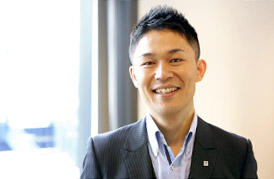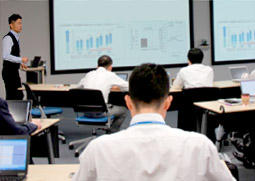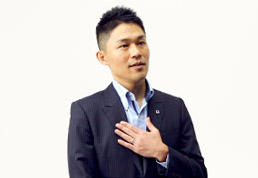Otsuka People Talk
Product Management Manager, Pharmaceutical Business Division
I feel that the product I am managing is like my child. As the product grows, I grow with it.
An interview with a manager in charge of marketing a product that was first discovered in Japan. He is guided by his experiences as a medical representative (MR) and working in product development.
"What kind of medication do you want?"

In 1983, our top executive at the time happened to run into a medical specialist at an airport. He asked the doctor, "What kind of medication do you want?" The doctor replied, "A medication that makes patients pass only water." I heard that the executive seized on the idea and immediately directed our staff to develop a medication that would do that.
The product took 26 years to develop. What I didn't count on was that I would be put in charge of marketing it! Being the world's first with no comparable product before it, there was no marketing knowhow that we could draw on, and we had to go in blind, which made things very challenging. When I was first appointed as the Japanese product manager, I was ordered to go overseas to promote the product - In English. It was a very difficult start, and I've been running at full speed ever since.
The product becomes your child

At Otsuka Pharmaceutical I have the job title of PMM (Product Management Manager). This title is indicative of my responsibility towards the evolution of the product, rather than simply marketing it in the short term. When I became a PMM, I was told, "You're not just growing the product. You have to grow with the product as well."
It's said that parents grow together with their children, and I believe that statement to be true. Parents tend to force decisions on kids based on their pooled knowledge, but kids inevitably grow far beyond what their parents imagined, and learn much more than what their parents tell them. I, too, think about and plan the growth of the product, and I myself grow as well. The product is truly like my child. It is demanding, but I also see that it has great potential.
An unexpected reaction
Right after the product's release, I had to travel overseas in the coldest part of winter. One snowy night, I got a frantic phone call from a colleague in Japan reporting a side effect that had never been seen before. I vividly remember thinking when I got the call that there was a lot I needed to do in response. I immediately asked for a report on the affected patient's status, and initiated an investigation as to how the situation arose.

Because the side effect was completely unexpected both in the field and among the developers, we made a big effort to talk in depth with all parties concerned, both internal and external, and established emergency protocols for making sure that the drug was used properly.
By ensuring a thorough understanding of the product's appropriate use, we were able to bring the product to the patients who could truly benefit from it. The product came about from a real need among doctors, so it had been designed to contribute to the well-being of patient, and I believe that helped pave its way to the market. Indeed, there were many patients who had been waiting for it, and we received many grateful reports from them. If I were able to go back in time to that most difficult period, I would tell myself, "Don't worry-you can do it!"
The good part of being a PMM is that it allows me to directly address the needs of medical professionals, and, in turn, feel the satisfaction of the response to my actions. Because what I manage is so unique, there is also the satisfaction of knowing that we will not be imitated.
Think about the essentials, and tailor your actions accordingly
"Prevail over unfair fairness." When I joined Otsuka, this is what our then chief executive told new staff. It was in the context of a speech encouraging new employees to become worthy citizens. It's a company that will properly support its workers for doing fundamentally sound work-even those that appear odd at first glance.

When taking on a challenge, there will always be people opposed to your endeavors. It's a never-ending cycle of having to explain why it is necessary to face the challenge, thoroughly describing objectives and so on, and repeating the process until the other parties are convinced.
Through my experiences at Otsuka, I have learned that the company is not obsessed with following conventions-one has freedom to do what one feels is right. But with that freedom comes great responsibility and results are mandatory. I think that Otsuka is a liberal company in a good way. I handle all my daily affairs with the view that if I were to become complacent and satisfied with the status quo, the product's-and my own-growth will stop.
Because I love my product, I think about it all day long. However, I also know that simply telling people to like this product will not make them embrace it. I always tell my team members, "Think harder," so that they find ways to allow people to proactively get to like the product without having it forced on them. When people get busy, they inevitably tend to focus only on what is in front of them, which is why I always stress to my team "Think about the essentials, and tailor your actions accordingly." That's more easily said than done, but it is of paramount importance, and that's why we do it.





